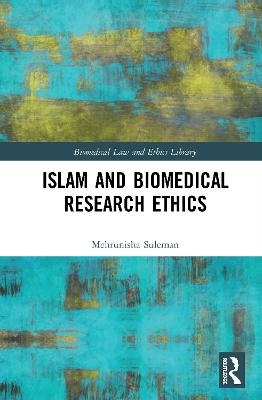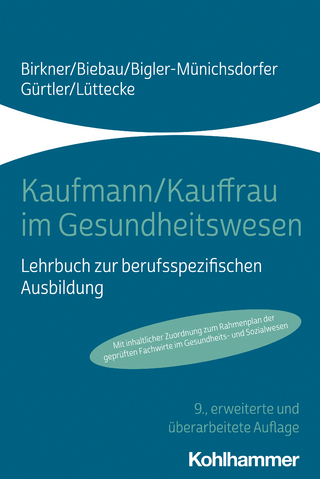
Islam and Biomedical Research Ethics
Seiten
2020
Routledge (Verlag)
978-0-367-19147-4 (ISBN)
Routledge (Verlag)
978-0-367-19147-4 (ISBN)
This book contributes to the nascent discourse on global health and biomedical research ethics involving Muslim populations and Islamic contexts. It presents a rich sociological account about the ways in which debates and questions involving Islam within the biomedical research context are negotiated - a perspective which is currently lacking.
This book is a contribution to the nascent discourse on global health and biomedical research ethics involving Muslim populations and Islamic contexts. It presents a rich sociological account about the ways in which debates and questions involving Islam within the biomedical research context are negotiated - a perspective which is currently lacking within the broader bioethics literature. The book tackles some key understudied areas including: role of faith in moral deliberations within biomedical research ethics, the moral anxiety and frustration experienced by researchers when having to negotiate multiple moral sources and how the marginalisation of women, the prejudice and abuse faced by groups such as sex workers and those from the LGBT community are encountered and negotiated in such contexts. The volume provides a valuable resource for researchers and scholars in this area by providing a systematic review of ethical guidelines and a rich case-based account of the ethical issues emerging in biomedical research in contexts where Islam and the religious moral commitments of Muslims are pertinent.
The book will be essential for those conducting research in low and middle income countries that have significant Muslim populations and for those in Muslim-minority settings. It will also appeal to researchers and scholars in religious studies, social sciences, philosophy, anthropology and theology, as well as the fields of biomedical ethics, Islamic ethics and global health..
This book is a contribution to the nascent discourse on global health and biomedical research ethics involving Muslim populations and Islamic contexts. It presents a rich sociological account about the ways in which debates and questions involving Islam within the biomedical research context are negotiated - a perspective which is currently lacking within the broader bioethics literature. The book tackles some key understudied areas including: role of faith in moral deliberations within biomedical research ethics, the moral anxiety and frustration experienced by researchers when having to negotiate multiple moral sources and how the marginalisation of women, the prejudice and abuse faced by groups such as sex workers and those from the LGBT community are encountered and negotiated in such contexts. The volume provides a valuable resource for researchers and scholars in this area by providing a systematic review of ethical guidelines and a rich case-based account of the ethical issues emerging in biomedical research in contexts where Islam and the religious moral commitments of Muslims are pertinent.
The book will be essential for those conducting research in low and middle income countries that have significant Muslim populations and for those in Muslim-minority settings. It will also appeal to researchers and scholars in religious studies, social sciences, philosophy, anthropology and theology, as well as the fields of biomedical ethics, Islamic ethics and global health..
Mehrunisha Suleman is a postdoctoral researcher at the Centre of Islamic Studies, University of Cambridge.
1 Introduction;
2 Guideline Review;
3 Role of Islamic Institutional Forms of Islam in Biomedical Research Ethics;
Religious texts, scholars and their legal edicts;
4 Islamic responses to ethical issues in HIV/AIDS research;
Deeper analysis of the role of ijtihad and fatawah in the context of global health research ethics;
5 Women and biomedical research ethics;
Religion, culture and ethics;
6 Personal faith and biomedical research ethics;
Encountering the moral universe of Muslim researchers;
7 Negotiating multiple moral resources;
Key findings and recommendations for future research;
8 Methodological Annexe;
Appendix;
| Erscheinungsdatum | 09.07.2020 |
|---|---|
| Reihe/Serie | Biomedical Law and Ethics Library |
| Zusatzinfo | 12 Tables, black and white; 2 Line drawings, black and white; 2 Illustrations, black and white |
| Verlagsort | London |
| Sprache | englisch |
| Maße | 156 x 234 mm |
| Gewicht | 453 g |
| Themenwelt | Sachbuch/Ratgeber ► Gesundheit / Leben / Psychologie |
| Geisteswissenschaften ► Religion / Theologie ► Islam | |
| Studium ► Querschnittsbereiche ► Prävention / Gesundheitsförderung | |
| Recht / Steuern ► Allgemeines / Lexika | |
| Recht / Steuern ► EU / Internationales Recht | |
| Sozialwissenschaften ► Soziologie ► Spezielle Soziologien | |
| ISBN-10 | 0-367-19147-4 / 0367191474 |
| ISBN-13 | 978-0-367-19147-4 / 9780367191474 |
| Zustand | Neuware |
| Haben Sie eine Frage zum Produkt? |
Mehr entdecken
aus dem Bereich
aus dem Bereich
Orthomolekulare Medizin in Prävention, Diagnostik und Therapie
Buch | Hardcover (2022)
Thieme (Verlag)
71,00 €
Lehrbuch zur berufsspezifischen Ausbildung
Buch | Softcover (2021)
Kohlhammer (Verlag)
46,00 €


